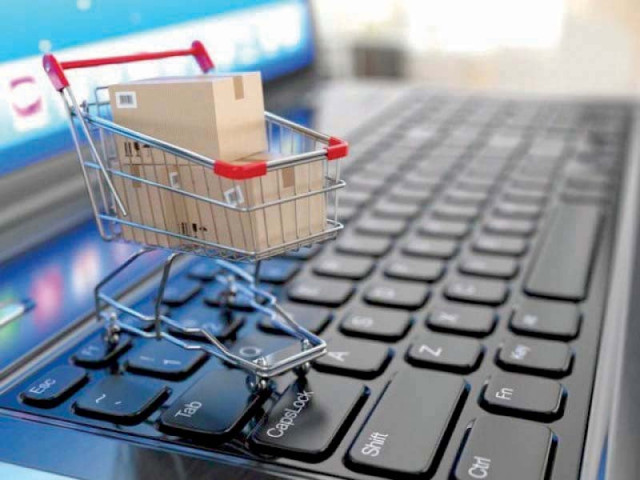Pakistan needs to create B2B linkages
Officials say B2B tie-up, online payment systems will produce new exporters

As Pakistan is marching towards digitalisation, it needs to focus on digital infrastructure besides creating business-to-business (B2B) linkages through the global e-commerce platforms to enhance its exports.
In an interview with The Express Tribune, Alibaba - a China-based e-commerce platform - Country Manager (Pakistan) Songsong underlined that efficient online platforms could encourage the youth of Pakistan to go for exports.
“There is a dire need to build online infrastructure, especially online payment systems for B2B transactions that can connect Pakistan with other countries,” he highlighted.
He pointed out that a B2B payment system was comparatively more complicated than a business-to-consumer (B2C) payment system.
He noted that making deals worth thousands of dollars “is different and complicated than selling to one individual, which needs sophisticated solutions”.
Sellers would have to ensure delivery of large quantities of goods to the buyers with focus on quality, he said.
In case of any dispute between the buyer and the seller, the online platform would be responsible for resolving it, he added.
At present, businesses “search the products on Alibaba and make the deal offline”, he said, adding that the platform would provide a complete export-import business cycle “once it possesses a B2B payment system”.
“Exporters need to involve banks for the letter of credit (LC) or as a guarantor,” he mentioned and added that the whole process would be done on Alibaba with ease that would encourage the youth to become exporters.
The B2B trade involved huge and repeated orders from the buyers and it was the task of online platforms to provide confidence to the buyers, he said.
“Pakistan is one of the fastest emerging e-commerce markets in the Asian region and the increasing level of trust of the global online trading groups is an indicator of the talent of young Pakistanis.”
Investment in technology and the IT sector paved the way for Pakistan to emerge as one of the fastest growing e-commerce markets in the world, he highlighted.
“With the expansion of ecommerce, Alibaba strives to unlock the untapped potential of SMEs (small and medium enterprises) in Pakistan,” he said.
SI Global CEO Noman Ahmed Said underlined that B2B referred to trade between businesses, such as the manufacturer to wholesaler or the wholesaler to retailer, etc.
“It refers to the business that is conducted between companies,” he mentioned.
Citing the research conducted by Forrester - a global market research company, he pointed out that the global B2B e-commerce market topped $1.13 trillion in 2018, which was well above its forecast of $954 billion during the year.
“Electronic payments have revolutionised the business process by reducing the reliance on paperwork, transaction costs and labour cost,” he said.
Discussing the advantages of electronic payments, he said that Pakistan should have an established gateway to exports through the online platforms via a B2B model.
“Internet provides a robust environment in which businesses can find out about products/ services and lay the groundwork for future B2B transactions.”
Interested parties (buyers) could learn about the company’s products/ services through the websites “and initiate contact”, he said.
“Online product and supply exchange websites allow businesses to search for products/ services and initiate procurement through e-procurement interfaces,” he added.
Moreover, specialised online directories, providing information about particular industries/ companies, also facilitate B2B transactions.
“E-commerce sites use electronic payments - paperless monetary transactions,” Said underlined, adding that ecommerce payment systems have enabled global payments, thus optimising performance “which is the key to export growth”.
“Payment systems like Paypal have made a major headway in going paperless across the world, however, it is yet to be established in Pakistan,” he emphasised.
“Fast, seamless and secure transactions are the goals that we must strive to achieve.”
Highlighting the importance of incorporating modern technology, Said mentioned that the State Bank of Pakistan (SBP) was also striving to introduce innovation in payment infrastructure to support global B2B transactions.
The services sector worldwide had been witnessing a shift towards digitisation, he noted. “Growing internet penetration is revolutionising the way consumers and businesses gain and share information, execute transactions and manage their day-to-day operations.”
Improved digital connectivity was reshaping consumer behaviour, which was increasingly tilting towards convenience, cost saving and customised retail experience, he maintained.
Businesses were also capitalising on opportunities emerging from digitisation, such as supply chain efficiency, lower transaction costs and enhanced flexibility in addressing consumer needs, Said mentioned.
“A spillover impact of such services has also been observed in the productivity of commodity-producing sectors, through processes such as automation and data handling,” he said.
“Pakistan is also among the economies where digitisation is triggering changes in some components of the services sector.”
The shift was prominent in domains like e-commerce, fintech and e-government, “where new ventures and approaches to delivering services are picking up pace”. Over the last few years, the market size of e-commerce has enhanced significantly in Pakistan, thus transforming the way consumers interact with - and especially pay - businesses.
“Hence, we must capitalise on it and expand our services accordingly,” Said remarked. According to the Pakistan Bureau of Statistics (PBS), Pakistan’s exports declined 10.29% to $25.26 billion in 2020 as compared to $28.15 billion in 2019.



















COMMENTS
Comments are moderated and generally will be posted if they are on-topic and not abusive.
For more information, please see our Comments FAQ